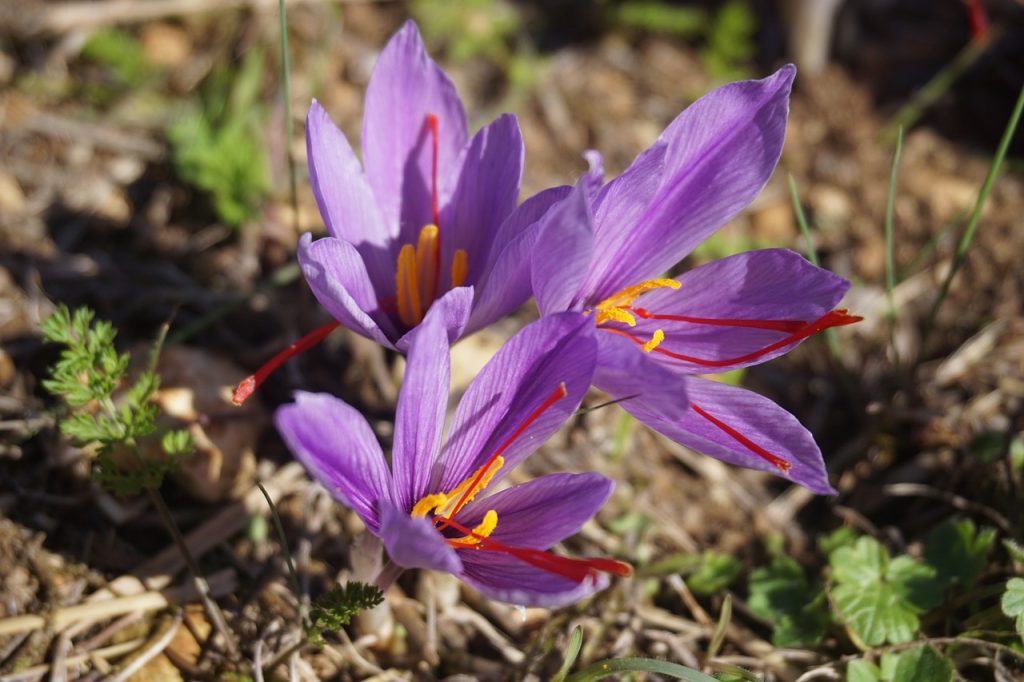
When it comes to spices, few can rival the allure and potency of saffron. This vibrant purple flower houses the highly prized crimson threads that have historically been cherished, traded and widely used for their powerful medicinal properties.
The History of Saffron
Saffron, is a fragrant and renown spice spice with a long history that spans centuries and civilizations. Derived from the delicate stigmas of the Crocus sativus flower, saffron has long been sought out for its unique flavor, therapeutic properties, and cultural significance.
Originating in the heart of the Persian Empire, saffron’s cultivation can be traced back to ancient times. This precious spice was often used as currency and stood as a symbol of wealth and status. Over the centuries, culinary and medicinal interest has only grown as the health benefits of saffron are becoming increasingly recognized by modern science.
In this article we will be taking a deeper look at the health benefits provided by saffron and ways in which individuals can use it in their everyday life.
Saffron for Mental Health
Studies have consistently demonstrated saffron’s remarkable ability to alleviate symptoms of anxiety and depression, often matching the efficacy of conventional pharmaceutical treatments. The active compounds in saffron, such as crocin and safranal, have been shown to interact with neurotransmitter systems in the brain, helping to restore balance and promote mental and emotional well being.
With minimal side effects and a growing body of scientific evidence, saffron presents a compelling alternative for those seeking a holistic solution to their emotional struggles but it is highly recommended to discuss with your healthcare practitioner prior to taking saffron if you are prescribed any medication or have
pre-existing mental health conditions.
Saffron as a Potent Antioxidant
Recent research has demonstrated saffron’s impressive ability to neutralize harmful free radicals, which often contribute to the development of various chronic diseases. By scavenging these unstable molecules, saffron helps to reduce oxidative stress and inflammation, two key factors that underlie many health problems in today’s world.
These anti oxidant properties make saffron a great choice as an add-on herbal remedy for diseases such as: cardiovascular diseases, Alzheimer’s disease and age-related macular degeneration.
Saffron and Cognitive Health
The consistent use of saffron has been linked with enhanced memory and cognitive function. Studies have shown improvements in attention, information processing, and even slowing the progression of age-related cognitive decline. Its neuroprotective properties make it a promising natural solution for supporting brain health throughout the lifespan.
In particular, the bioactive compound crocin has been shown to improve memory and learning abilities by enhancing brain neuroplasticity when combined with exercise. This is crucial for maintaining cognitive functions as we age and has studies involving both animal models and human subjects have demonstrated this effect.

Impact of Saffron on Cardiovascular Health
When it comes to maintaining a healthy heart, the saffron spice deserves a closer look. Emerging research suggests it may hold the key to cardiovascular well-being through its ability to support healthy blood pressure levels, improve cholesterol profiles, and protect against the damaging effects of oxidative stress .
Studies have shown that regular consumption of saffron can help reduce the risk of heart disease and stroke which are two of the leading causes of death worldwide.
How to Use Saffron in Everyday Life
The health benefits of saffron are apparent as numerous studies demonstrate and attest to its effects on human consumption. In the section below, we will be looking at ways in which saffron can be added in your day to help you reap its benefits:
- Morning Saffron Tea: Steep a few saffron strands in hot water for 10 minutes. Add honey or lemon for some extra flavor. This tea serves as a mood and energy booster.
- Breakfast Smoothie: Blend your favorite fruits with a pinch of saffron for an antioxidant-rich smoothie. Saffron pairs well with mango, banana, and different berries.
- Saffron Water: Add a few saffron strands to your water bottle and wait for them to infuse. This refreshing drink helps reduce anxiety and keeps you focused.
- Saffron Rice: Mix soaked saffron strands into your rice before cooking. It adds a distinctive flavor and a bright yellow color to your rice.
- Saffron Yogurt: Stir a pinch of saffron into warm milk, let it sit, then mix into plain yogurt with nuts and honey. This makes for a delicious and healthy snack and great for starting your morning energetically.
- Evening Saffron Milk: Heat milk with a few saffron strands and a pinch of cinnamon or cardamom. This calming drink promotes relaxation and better sleep.
Side Effects and Precautions
Saffron is generally safe in small amounts, but it’s important to consult with a healthcare provider before adding it to your routine, especially if you are pregnant, breastfeeding, have a chronic condition, or are taking medications.
Most people tolerate saffron well, but some may experience mild side effects such as nausea, dizziness, or mood swings. Allergic reactions, though rare, can occur and may include itching or swelling. Start with a small dose to ensure you do not have an adverse reaction. Avoid consuming more than 1.5 grams per day as high doses can be toxic and lead to serious health issues.
Pregnant women should be particularly cautious as high doses of saffron can stimulate the uterus and potentially lead to miscarriage. Always consult your doctor before using saffron if you have medical conditions like high blood pressure or mood disorders, as it may interact with certain medications such as blood thinners and antidepressants.
Remember, while numerous health benefits are offered by saffron, it should complement, not replace, modern medical treatments. Always approach herbal remedies with a balanced perspective and professional guidance.

